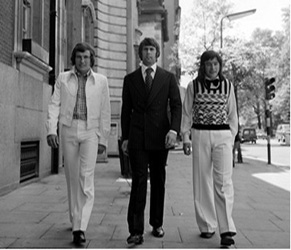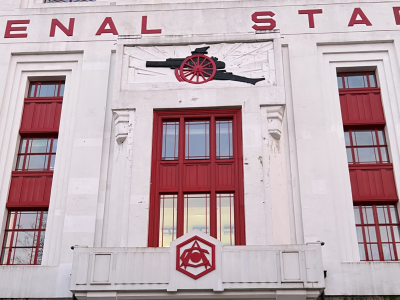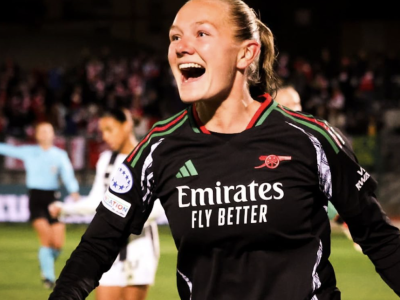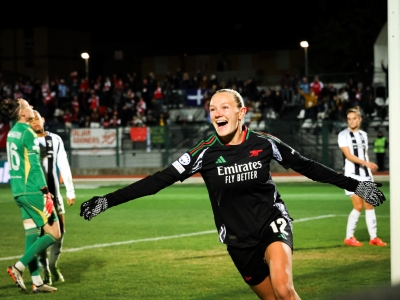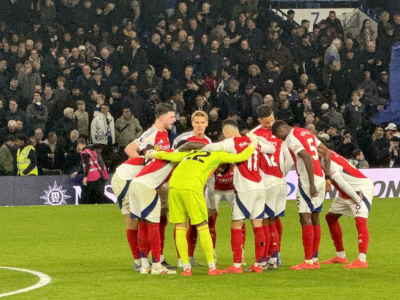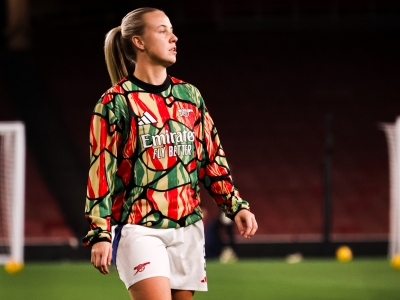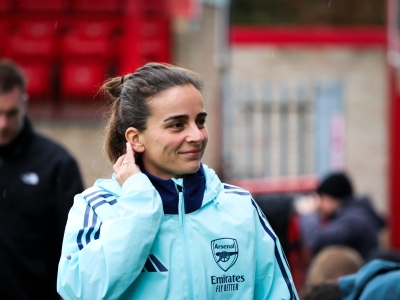Arsenal’s first competitive visit to the Boleyn Ground came as Woolwich Arsenal in January 1906, in the First Round of the FA Cup. The Gunners left with a 3-2 win in front of a crowd 12,000. By the time of the Gunners’ next visit they’d moved to Highbury and renamed simply as Arsenal. The Gunners visit to the Boleyn Ground in late August 1923 was West Ham’s first home fixture in the top tier, with the Hammers inflicting a 0-1 defeat on Arsenal. Arsenal’s first League win at Upton Park came with Herbert Chapman’s first away trip to West Ham as Gunners boss. Arsenal achieved a thumping 4-0 win with two goals apiece for Jimmy Brain and Charles Buchan. Chapman’s next visit in early March 1927 however saw a 0-7 thrashing for the Gunners, which included two own goals.
Chapman however had a reasonable record at the Boleyn Ground winning four matches out of seven, which included a 4-3 win in late February 1929 with goals from Jimmy Brain, David Jack, Sid Hoar and Joe Hulme; a 3-0 win on route to Arsenal’s first victorious FA Cup campaign at the Quarter Final stage in early March 1930 (on target for Arsenal was Alf Baker and two for Jack Lambert) and a 4-2 win on route to Arsenal’s first title in late February 1931 with goals for Bob John, Cliff Bastin and two for David Jack. West Ham’s first run in the top tier lasted nine seasons, all but two of those ending in bottom half finishes for the Hammers.
One fixture of note at the Boleyn Ground during this period was a visit from Everton which was witnessed by the visiting Spanish national side - the Pathe caption noting that Football was now more popular in Spain than Bullfighting as well as making reference to their Star player Zamora earning as much as £30 per week. This Zamora of course wasn’t twenty first Century Hammers goal scorer Bobby, but Barcelona, Espanyol and Real Madrid goalkeeper Ricardo Zamora. The aforementioned found fame in 1929, in a match against England after carrying on playing with a broken Sternum and helping Spain become the first side outside of the British Isles to beat the English national side. The match witnessed by Zamora et al ended in a 4-2 win for West Ham.
West Ham finished rock bottom of the old First Division in 1931/32, with Arsenal’s last pre-war visit to Upton Park at the end of March 1932 ending in a 1-1 draw, with a goal from Jack Lambert. West Ham’s first season back in the second tier saw them finish as low as twentieth place in the League, however the Hammers put together an FA Cup run of sorts, reaching the Semi Final though losing 1-2 to Everton at Wolves’s Molineux Ground. West Ham spent the rest of the 1930s in the second tier, though the Hammers managed to reach the Football League War Cup Final against Blackburn Rovers in June 1940 at Wembley. The competition sprung up amidst the ‘Phoney War’ period where no bombing activity took place in the British Isles, however the weeks leading up to this final witnessed the evacuation of Dunkirk and fears that German bombing campaigns on London could commence at any time.
Despite this, 42,300 fans braved the threat of bombing raids to witness the final, which West Ham won 1-0 with a goal from Sam Small pouncing on a parried shot from Hammers forward George Foreman (not he of World Heavyweight Championship and fat free Meat Grill fame). When the War ended in 1945, it was another twelve months before League Football recommenced. The FA Cup however resumed in 1945/46, though for one season only would be played on a two-leg basis. Arsenal drew West Ham for their first Post-War competitive match, with the first leg played at the Boleyn Ground, the Gunners however suffered a 0-6 hammering. In the Second Leg at Highbury, Arsenal could only muster a 1-0 win in reply.
West Ham finally returned to the top flight in 1957/58 as second tier champions, finishing one point ahead of runners up Blackburn Rovers, that same season however the Hammers exited the FA Cup with a 2-3 defeat to Fulham at the Boleyn Ground. Arsenal’s first two Post-War League visit to Upton Park ended in 0-0 draws in November 1958 and April 1960. Exactly six months on, West Ham inflicted a 0-6 defeat on Arsenal at Upton Park with a hat-trick for Dave Dunmore and also among the goals for West Ham was Welshman Phil Woosnam (cousin of Golfer Ian Woosnam), who left English football in 1967 to play for Atlanta Chiefs in the USA.
Two years later, Woosnam was appointed commissioner of the North American Soccer League (NASL) – a position he oversaw for fifteen years, during the League’s halcyon days when the likes of the Warner Brothers owned New York Cosmos attracted stars such as Pele, Carlos Alberto and Franz Beckenbauer, as well as other stars such as George Best, Gerd Muller, the recently departed Johan Cruyff, Teófilo Cubillas and West Ham’s own Bobby Moore playing for other NASL franchises. Back in 1961 however, the ability for English footballers to take up big money offers across the Atlantic (or anywhere) seemed extremely remote. Though for players whose clubs were willing to sell – such as John Charles, Eddie Firmani, Gerry Hitchens, Jimmy Greaves and Denis Law – there was the lure of the Lira, English footballers generally faced a severe restraint on their employment and earnings.
In 1960/61 however, the PFA led by Jimmy Hill were mounting a stern challenge to the maximum wage and ‘retain and transfer’ system. Here West Ham chairman Reg Pratt, in an interview with ITN at the time, speaks in defence of the existing system (though within a two years both the maximum wage and retain and transfer were consigned to history). Meanwhile, in the first season after the scrapping of the maximum wage Arsenal visited the Boleyn Ground in late April 1962 to play out a 3-3 draw with Danny Clapton, Johnny McLeod and Geoff Strong on target for the Gunners. Eleven months later, Arsenal would bag their first win at Upton Park for thirty two years with a thumping 4-0 win with goals for Geoff Strong, Billy McCullough and two for Joe Baker.
In 1963/64 West Ham reached their first FA Cup Final for forty one years, after beating Man United 3-1 in the Semi Final on a quagmire of a pitch at Hillsborough, on route to winning their first major honour at Wembley against Preston North End the following month. One week on from the Semi Final victory Arsenal visited Upton Park, leaving with a point after a 1-1 draw with Geoff Hurst on target for the Hammers, while Alan Skirton would be on target for the Gunners. West Ham would also make their first appearance on Match of the Day in September 1964, in a 3-2 win over Tottenham Hotspur. In that first season of the show, West Ham would feature no less than seven times, including a 2-1 win at Upton Park against the reigning league champions Liverpool.
One month later, Arsenal’s visit to the Boleyn Ground would be captured by the Match of the Day cameras. Goals from Johnny Byrne and Geoff Hurst inflicted a 1-2 defeat on Arsenal, with Joe Baker on target for the Gunners. The following season, the cameras would also capture a 4-0 home win for the Hammers over Sheffield United. Thirteen months on, West Ham would repeat the same score line with Arsenal suffering another 1-2 defeat at the Boleyn Ground with Johnny Byrne and Peter Brabrook scoring for West Ham, while Tommy Baldwin would be on target for the Gunners. Three and a half months later, West Ham would have a major hand in England winning the 1966 World Cup Final with a hat-trick for Geoff Hurst, Martin Peters also on the score line and Bobby Moore the captain of the side.
The aforementioned went on to become the pin up boy of English football, appearing here in an ad at the time imploring the viewer to ‘look in at the local’, filmed in what looks like Mooro’s old pub - the Two Puddings in Stratford, which stood just yards from where West Ham will be playing as of next season. Just three weeks on from the World Cup win, West Ham’s opening fixture of the 1966/67 season would be at home to Chelsea where they suffered a 1-2 defeat with Charlie Cooke and John Hollins on the score sheet for the Blues, while Ronnie Boyce would be on target for the Hammers.
Arsenal would go on to play West Ham twice within the next nine days – a 2-1 win at Highbury in Bertie Mee’s first home fixture as boss, with Tommy Baldwin and John Radford on the scoresheet while Johnny Byrne would be on target for the Hammers. Six days later the return fixture was played at Upton Park which ended in a 2-2 draw, with Frank McLintock and Jon Sammels on the scoresheet for Arsenal while Bobby Moore and Peter Brabrook were on target for West Ham. In the late 1960s however, the Hammers spent all but one season in the bottom half of the table with the highest placed finish being in 1968/69 when the Hammers came eighth. West Ham that same season managed a 2-1 win over reigning Champions Manchester City before the TV cameras.
In 1968/69, Arsenal also achieved only their second post war win at the Boleyn Ground with a 2-1 victory in April, with George Graham and Jon Sammels were on the scoresheet for the Gunners. Arsenal returned to Upton Park four months later to play out a 1-1 draw with West Ham and making his debut for the Hammers would be Bermudan forward Clyde Best, one of the earliest black players within the English game. By December he would be joined by Jimmy Greaves from Spurs in part exchange with Martin Peters. On Greavsie’s debut the Hammers thumped Man City 5-1 away with two goals for Jimmy Greaves and a superb forty yard volley from Ronnie Boyce on the end of Joe Corrigan’s kick out from his penalty box. Greavsie’s form however was not good enough for inclusion in England’s Mexico ’70 World Cup squad, though bizarrely he actually competed in a London to Mexico City World Cup rally and finished sixth.
For those who did travel to Mexico there was an unexpected hitch which followed after England’s 4-0 win over Colombia in Bogota, with Bobby Moore arrested on suspicion of stealing a bracelet, however Mooro was released in time to join the England squad in Mexico in time for the Championship. Bobby however, along with his team mate Jimmy Greaves and two other players were in big trouble with Ron Greenwood after a 0-4 defeat in the FA Cup third round to Blackpool.
Moore’s performance was so poor that Blackpool assistant manager Jimmy Meadows called him the ‘worst defender in the World’ (though the club later offered an apology for his words). The press however caught on to a late night drinking session at the night club of former British Heavyweight Champion Brian London the night before the game which led Greenwood to take action. Allegedly Ron had wanted to sack all five of them but the Board of Directors persuaded him that fines and suspensions would be sufficient. Mooro however would be non-plussed by the incident stating: ‘I had met Brian London on several occasions and thought it good idea to look him up at his Blackpool nightclub….We thought very little of it and we were in bed by 1.30am and got up at 10am. That’s a good night’s sleep by anyone’s standards’.
After a 0-0 draw at Upton Park back in August, Arsenal would reap the benefit of the fall out by defeating West Ham at Highbury. One week later though, the Hammers nearly did Arsenal a favour in the title race, coming from two goals down but ultimately losing losing 2-3 to Leeds United at Upton Park, which gave the Yorkshire side a three point cushion over Arsenal who suffered a 1-2 loss away at Huddersfield that same day. Jack Charlton’s post-match interview however would be scathing, claiming it was the worst West Ham display he’d seen despite them nearly grabbing a point. One funny thing about this footage is commentator Brian Moore’s disapproval at young kids running onto the pitch during play.
The breakdown of law and order in the Upton Park area however would be nothing compared to the fictional world at the time in ‘Budgie’ - the popular comedy-drama of the time, where the main character gets shot by a rogue gun man aiming for his gangster friend Charlie Endell. In the opening scene, Budgie (played by singer Adam Faith) threatens to have his wife Hazel up against the race relations board for turning the telly off before a Clyde Best goal was shown by Brian Moore on ITV’s ‘On the Ball’. In 1971/72, West Ham played out a 3-3 draw with that season’s eventual champions Derby County. For Arsenal however, that season would be a third draw in succession at Upton Park in December 1971 with a 0-0 score line.
In late 1972, Bobby Moore would be finally cleared of all charges in relation to the Bogota incident. The Gunners would put a championship challenge of sorts together in 1972/73, though by the time they visited the Boleyn Ground in April the title was all but conceded to Liverpool. Arsenal however still put in a shift and pulled off a 2-1 win with goals from Ray Kennedy and John Radford, while Trevor Brooking would be on the scoresheet for the Hammers. Arsenal would make it back to back wins at Upton Park six months later with a 3-1 win secured by goals from Charlie George and two for Alan Ball, while Billy Bonds would be on target for the Hammers. Making his debut for West Ham in that game would be Highbury old boy Bobby Gould, who would spend two years at Upton Park.
Gould would be on the scoresheet for West Ham in a a 5-2 win over Wolves at Upton Park in November 1974, along with Billy Bonds, Trevor Brooking, Frank Lampard Snr. and Billy Jennings. A month later, just ahead of Christmas, West Ham would play out a 1-1 draw with Chelsea at Stamford Bridge in an episode of ‘The Big Match’ hosted by Arsenal’s Terry Mancini. In 1974/75 West Ham would win their second FA Cup with a run-in which included a Quarter Final win on a quagmire of a pitch at Highbury and defeating Ipswich at Stamford Bridge after a replay in the Semi-Final.
West Ham would meet their old captain Bobby Moore in the final, now turning out for second tier Fulham. Five days prior to the FA Cup Final however the Hammers would meet Arsenal at the Boleyn Ground for the final game of the season. Arsenal had had a disastrous term in 1974/75, though forty eight hours before had secured their place in the old First Division by beating Tottenham 1-0 at Highbury leaving Spurs needing a win against European Cup Finalists Leeds United that same evening (which they duly did). With nothing left to play for, Arsenal succumbed to a Graham Paddon goal which inflicted a 0-1 defeat on the Gunners. West Ham’s end of season form had been terrible, losing eight of their last nine - including four straight defeats – before finally recording a win in their last fixture of the League season.

